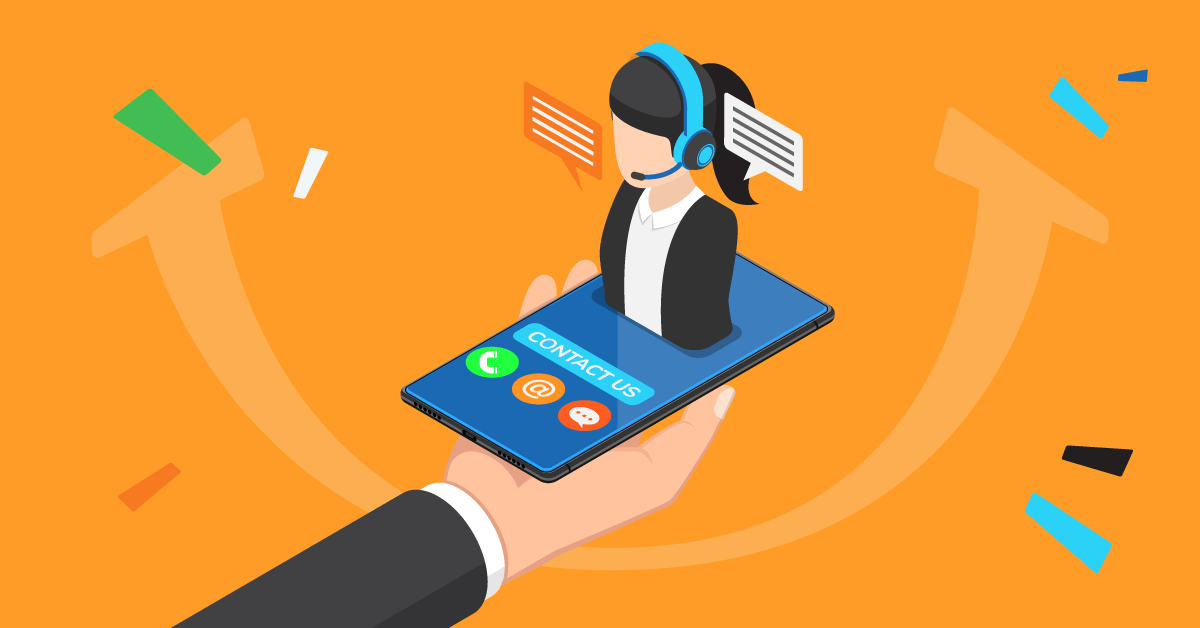Your product or service is exactly what your customers want. You’ve carefully designed it so that it caters to your clients’ needs. You’ve spent time and effort into improving it, promoting it, selling it, and distributing it, but your sales seem not to hit the mark.
It all goes down to this: No matter how great your product or service is, you can always do better! It’s important to aim for exceptional customer service because:
- 93% of customers are likely to purchase repeatedly from companies that offer excellent customer service.
- 83% of customers feel more loyal to brands that respond to and resolve their complaints.
- 69% of customers have stopped doing business with a brand due to a negative customer service experience.
- 56% of customers say that they would pay a premium price for a product to get outstanding customer support.
As many as 80% of businesses report that they provide excellent customer service, but only 8% of customers seem to agree. How is such a huge gap in perception possible? Well, many service teams simply don’t have the customer support skills to understand what customers actually want.
An even more startling figure is that U.S. businesses are losing up to $62 billion a year because of poor service. This figure is on the rise as businesses fail to train customer service staff well enough to deal with the increasing demands of their job.
But worry not–developing customer service skills in the workplace can help your customer support teams brighten this picture.
Looking for an eLearning platform to enhance customer service skills?
Create customer service training in no time with TalentLMS.
The training platform that users consistently rank #1.
The must-teach customer service skills
Dissatisfaction with customer service is a core reason behind customers jumping ship and switching to a different product or brand. The good news is that superstar customer service staff can retain clients and boost business growth.
From being master communicators to persuasive product experts, the best customer support reps apply the following customer service skills to keep customers and business owners happy:
1. Clear communication skills
A flair for communication is often one of the first customer service skills that come to mind. Probably because we’ve all experienced the opposite: a customer support rep who speaks unclearly, struggles to explain product benefits, and expresses no enthusiasm for their job.
As your customer service teams are on the front lines of problem-solving, they need to have the ability to communicate clearly when working with customers. They are the voice of your organization to your customers, and at the same time, they represent the needs of the customers to your organization.
When communication is clear and simple, misunderstandings hardly ever happen, and there is no disappointment or frustration. Your people should learn through customer service skills training not only to use language that’s easy to understand, or be cheerful and tactful, but also to be polite, reasonable, and straightforward with dates, prices, billing, and turnaround times.
2. Effective listening skills
Having good listening skills doesn’t mean just having a high-quality headset or turning off notifications during a customer call. It’s all about understanding what your customers’ issues are and paying attention to what they have to say. If you want loyal customers, start by actively listening to them. They’ll tell you exactly what they want and how you can impress them.
Enhance your teams’ skills for customer service by adding training courses on active listening. Your customer service teams will learn how to:
- Be present during their conversations with customers
- Pay attention to the smallest details
- Never interrupt
- Check if they’re collecting the right information by repeating what has been discussed
- Not take it personally if a customer is upset
- Ask follow-up questions
3. Writing skills
One of the most important customer service skills is good writing. Customer service doesn’t only happen through face-to-face or voice-to-voice interactions. Sometimes your people will have to provide answers through a messaging app or an email.
How your teams phrase a sentence can make a big difference between sounding arrogant (“You have to log in first”) and a person that truly cares (“Logging in should help you solve this issue quickly!”).
Also, good grammar and syntax and using complete sentences are qualities that elevate the trustworthiness of your company. You can start by providing proofreading tools, encouraging your employees to write more, or implementing coaching sessions in their customer service skills training where they will be able to practice their writing skills with the help of an expert.
4. Empathy skills
Every customer wants their issue resolved. But even more than that, customers want to feel heard and understood. The ability to understand a customer’s pain point is a prized skill in customer service. Even with particularly tricky customers, an excellent customer service rep will be able to put themselves in the shoes of their customer and view the situation from their perspective. In fact, 96% of consumers view empathy as important in customer support interactions.
This skill can be developed through training activities like scenarios and gamification. For example, a scenario could involve a customer with a complicated, layered problem that the learner must fully understand to choose their next action correctly.
Another way to incorporate empathy into your team’s customer service skills is to value personalized service—even when the product you sell isn’t personal. For example, customer service for products and services like insurance or medical plans can often come across as sterile. The last thing you want is for your customers to feel like “just another number.”
5. Time management skills
Time is everything. In fact, if we could all use more of it, we would do it in a heartbeat. And your customers feel the same way, too. If you put your customers on the back burner, even if it’s about a couple of minutes, they are more likely to stop doing business with you. Thus, quick response times are essential.
Make sure your customer service teams have the knowledge to effectively manage their time by offering time management courses in their L&D program. Proper time management skills will allow them to plan and complete their other job-related tasks so they won’t have to choose between assisting a customer and fulfilling other responsibilities. And at the same time, learn how to find quick and correct solutions for your customers.

Meet TalentLibrary™
A growing collection of ready-made courses that cover the soft skills
your teams need for success at work![]()

6. Crisis management skills
“Customers don’t expect you to be perfect. They do expect you to fix things when they go wrong” — Donald Porter
In a crisis, customer service reps need to keep their cool, focus on helping the customer and uphold the reputation of the business simultaneously. That’s not a small ask!
Effective crisis management requires a can-do attitude and willingness to problem-solve to get the customer the results that they expect. Reps also need a thick skin—they can’t take it personally when clients are upset or worked up in a crisis.
Finally, it’s important that customer service reps be willing to accept responsibility on behalf of the business even if a problem isn’t directly their fault. This bolsters customers’ trust in the business’s sense of accountability.
7. Persuasion and negotiation skills
Persuasion skills are perhaps one of the trickiest customer service skills to master. The ability to persuade depends on several other abilities, including the communication and compassion skills covered earlier.
Highly developed negotiation skills are also essential for reps who are trying to persuade customers to trust their judgment about a solution to a problem, or a specific service option. To achieve this, reps need to be trained to identify the “deal points” for customers—the points at which customers feel satisfied, without costing the business too much.
When you’re trying to get the customer over to your side, you need to help them feel like they’re not losing out, but gaining through your customer service interactions. Customer service reps who are empowered and trained to offer appropriate incentives for customers to stay with the company after experiencing issues are much more likely to retain customers.
8. Product knowledge skills
This might seem obvious, but if a customer reports an issue with a product, they want to speak to someone who actually knows something about that product. Customer service reps should be so confident in their product knowledge that they’re able to teach the customer about the product as they resolve their problem.
Thorough knowledge of any flaws or common misunderstandings of the product or service you offer also prepares your support team to deal with these problems. An inside-out understanding of the benefits and strengths of your product or service supports reps in being able to win over a frustrated customer by emphasizing the positives, too.

9. Proactiveness and diligence skills
Being proactive and diligent is often overlooked among customer service skills. But some forward-thinking and attention to detail can make the difference between delivering good or truly impressive customer service. That’s probably why the high-tech venture investor of Silicon Valley, William H. Davidow, said that “The longer you wait, the harder it is to produce outstanding customer service.”
Reps need to think about their customer before the customer thinks of them. For example, reps should be encouraged to get in touch with a customer 48 hours after their last interaction to check if they are still experiencing any problems.
Diligence relates to meeting deadlines and delivering on promises. A lack of diligence undermines your trustworthiness and competence in the customer’s eyes. Reps should be trained to process tickets, claims, and other paperwork (digital or not) as soon as possible to avoid delaying the solution or forgetting any of the details.
10. Problem-solving skills
Sometimes, it’s hard for customers to diagnose their issues correctly. More often than not, customer service representatives need to be able to reproduce the trouble before finding a solution. So, they need to put their intuition to work and explore what might have gone wrong, but also reflect on the action path of the customer.
For example, a customer might not be able to log into their account. The customer service rep must be able to think that this occurs because the customer is having trouble resetting their password.
A problem-solving pro is able to understand what went wrong, provide advice or a solution, come up with workarounds, and at the same time, educate the customer on how they can do it on their own in the future.
How can you arm your customer support staff?
Without mastering these ten vital customer service skills, it’s all too easy for support teams to miss out on opportunities to impress, win over, and retain customers. To develop these core skills, customer support training content should be easily updated to include new scenarios, skills, or customer pain points.
Originally published on: 25 Apr 2018 | Tags: Customer Support,Employee Training,Soft Skills Development



